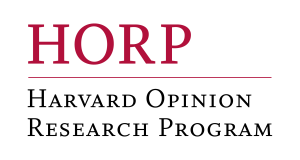 The Harvard Opinion Research Program has played a key role in over 300 public opinion surveys on health and social policy in the U.S. and nearly 30 other countries. The Program is unique in its effort to assess people’s attitudes in relationship to their knowledge, values, and experiences. The Program’s researchers have published more than 200 articles in five major areas of research, listed below.
The Harvard Opinion Research Program has played a key role in over 300 public opinion surveys on health and social policy in the U.S. and nearly 30 other countries. The Program is unique in its effort to assess people’s attitudes in relationship to their knowledge, values, and experiences. The Program’s researchers have published more than 200 articles in five major areas of research, listed below.
Health care policy studies: The Program conducts and analyzes opinion surveys on a variety of health policy issues, including Medicare, the uninsured, national health system reform, managed care, tobacco and drug use, end-of-life care, abortion, access to medical care, and individuals’ experiences with health services. One collaborative study received the National Press Club’s 1998 Award for Consumer Journalism. A recent study funded by the Robert Wood Johnson Foundation focuses on the experiences of health care consumers across the country and in seven states.
Outbreaks and Public Health Emergencies: HORP has been on the leading edge of conducting surveys both domestically and globally to understand public and provider perspectives on infectious disease outbreaks as well as other emergencies, including bioterrorism and natural disasters. Our surveys address views and experiences with individual prevention measures, like vaccination, as well as related policies and programs ranging from contact tracing to school closure. The surveys aim to support communication and program development, with an eye toward practical and applied findings for action by public health leaders, including communicators and policymakers. Our surveys often have a particular focus on at-risk communities, including those that have been marginalized by historic inequities in infrastructure and by discrimination, aiming to enhance outreach, and ultimately, address inequities in health outcomes.
Major initiatives include a multi-year project, Enhancing Trust: Public Views in COVID-19, which includes national surveys and support to state and local public health agencies in order to enhance related communications. The project is funded by the Centers for Disease Control and Prevention (CDC) through a cooperative agreement with the Association of State and Territorial Health Officials (ASTHO). Additionally, HORP is working on a largescale, mixed-methods study supporting outreach efforts for Spanish and Chinese-speakers during COVID, also funded by the CDC. Globally, HORP has led numerous surveys about polio and childhood vaccination in countries at higher risk of transmission, including Pakistan, Afghanistan, Nigeria, and Somalia, in partnership with UNICEF. Results have informed both country-level efforts and the communication strategy for the Global Polio Eradication Initiative (GPEI). These projects build on a larger foundation that includes surveys about pandemic flu, Zika virus, Ebola and H1N1.
Economic and social policies: The Program has conducted surveys on a number of other domestic policy issues. The Program’s research has provided timely insights on policy debates about Social Security, public schools, poverty and welfare, the economy, race, and moral values. A series the Program conducted with the Washington Post and the Kaiser Family Foundation was nominated for a Pulitzer Prize. An ongoing polling series with POLITICO focuses on current health and related domestic policy issues. An ongoing polling series with National Public Radio focuses on life in rural America.
International public health and health policy studies: Program researchers have collaborated in the design and analysis of surveys on health and social policy issues in nearly thirty countries. Opinion surveys provide insights into how well the health and social systems of various countries satisfy the needs and expectations of those countries’ citizens. Further, researchers have particular expertise in developing knowledge, attitudes and practices (KAPs) polls to help public health practitioners and policymakers communicate and engage more effectively with the publics they serve regarding specific programs. In this arena, the Harvard Opinion Research Program has held a PCA with UNICEF since 2013 that has led to a critically important knowledge, attitudes, and practices (KAPs) research process supporting improved social and behavioral communication programs in polio-priority countries and has laid the foundation for the global communication strategy for polio.
Election studies: For more than a decade, Program researchers have conducted studies of the attitudes of voters in national and state elections. Topics include the health care agenda of voters in U.S. national elections, the role of issues in elections, and the views of issues voters. Findings from these studies routinely appear as Perspective and Special Report articles in The New England Journal of Medicine. The most recent article on public opinion and the future of the Affordable Care Act can be accessed on the NEJM site.



